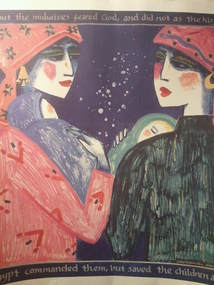 In this week’s lectionary, we see a Pharaoh who has forgotten and a Messiah cultivating memory. For the Pharaoh, Joseph has no impact on his life. He doesn’t remember the hard times of famine. He has lost sight of being saved. He’s not aware of needing relationship with Jacob’s descendants or of needing any leadership gifts other than his own. Jacob’s people become objects to be controlled for the sake of the nation’s economy. Now a new king arose over Egypt, who did not know Joseph. He said to his people, "Look, the Israelite people are more numerous and more powerful than we. Come, let us deal shrewdly with them, or they will increase and, in the event of war, join our enemies and fight against us and escape from the land." Therefore, they set taskmasters over them to oppress them with forced labor…. Exodus 1:8-2:10 Generations later the apostle Paul spoke words I wish Pharaoh could have heard so that he could have been brought in to the diverse body of God’s “remembering people”. “I say to everyone among you not to think of yourself more highly than you ought to think,…. We have gifts that differ according to the grace given to us” (Romans 12: 1-8). It was 2 midwives who remembered and kept alive a slender thread of relationship between two peoples. Shiphrah and Puah are the only two Egyptian women remembered in Exodus by name. They knew the Israelites. One line of conversation from woman to woman kept baby Moses alive. Last Sunday, Rev. Chong Choi preached an awesome sermon about the power of the words we choose. He addressed the “murmuring” that plagues so many churches in which we know the people we live side by side so well we forget the sacred nature of those relationships. Jesus asked his friends, who were coming to know well in daily life together, “who am I to you?” “What’s my role in your life?” Matthew 16: 13-20. It’s an important question for each of our faith walks, worthy of a day of retreat and prayer, of practice remembering why Jesus matters to each of us personally and all of us together. I’m also starting to think it’s a question we should ask each other, both in the body of Christ and in the wider world. “Who am I to you?” “What impact do my actions and presence have on your life?” A question can be more powerful than a teaching. Or rather, a question can prompt shared teaching that comes when people are open to each other. “Where does it hurt?” is the basis of an interview with theologian Dr. Ruby Sales that re-aired this week via On Being. A time of pain in her own life that led to the moment when she “realized God had always been with me, even when I wasn’t with myself” and led her back to faith. Asking that question of young people has transformed her relationships with them. Listening can be more powerful than speaking. Our summer Basic Lay Servant Ministry class has been practicing listening in deeper ways each week. It is a sacred time knitting relationships between brothers and sisters in Christ of diverse ages. But many young people have not found those listening places in our churches. Young people are flocking to “On Being”, an audio landscape that creates relationship between disparate voices. It’s time we remember that, as saved and gifted people, we are called to be humble leaders and listeners, reminding others through our listening that they are also gifted and beloved children of God. We may find Christ there, asking “who am I to you?” In God’s Grace, Karen
1 Comment
|
Karen L MunsonA pastor and artist, I'm wondering while I'm wandering through God's marvelous creation. Archives
March 2020
Categories |
 RSS Feed
RSS Feed